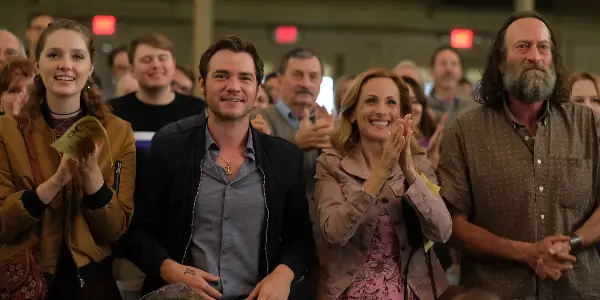There aren’t many groundbreaking elements in Siân Heder‘s sophomore feature CODA. It’s a movie, part coming-of-age and part family drama, which leans heavily toward the archetype of the subgenre. And yet, in spite of all the familiarity, Heder finds a way to make the movie engaging from start to finish. Her direction, though never flashy, is always solid. Her writing is honest and filled with a lot of heart, capturing humanity and warmth in every scene. And most important of all, the performances she draws from her actors always hits the right note that it’s nearly impossible for you to not fall in love with this movie.
Familial Responsibility
The title CODA refers to Child of Deaf Adults, and in this remake of the Cesar-nominated La Famille Bélier, the child in question is Ruby (Emilia Jones), a high school senior in Gloucester, Massachusetts whose plate is fuller than most kids the same age as her. Her parents, father Frank (Troy Kotsur) and mom Jackie (Marlee Matlin), as well as her older brother Leo (Daniel Durant), are all deaf, which means that it’s up to Ruby to be the ear and mouth of the family; their go-between in any situation.

In one of the funniest scenes in the movie, Ruby accompanies her parents to a doctor’s appointment so that there will be someone who can translate what the doctor says to them and vice versa. At first, it seems like this scene is only used to set the comedic tone of the movie, and in a way, it does. But when you take a look at the scene more closely, you’ll find that Heder actually uses this scene to also establish the dynamic between Ruby and her family; to show us how almost impossible it is for them to function without Ruby’s presence. So in that sense, the picture of Ruby leaving them to continue her studies at a music school in Boston — an epiphany that happens to Ruby after her choir teacher Mr. Bernardo Villalobos (Eugenio Derbez) discovers her singing talent — feels earth-shattering in a lot of ways.
This push-and-pull dynamic between Ruby leaving her family to pursue her dream or Ruby staying home instead to help them and their business is at the center of CODA. And throughout the movie, we see how this really affects Ruby internally. If this sounds like a tear-jerking family melodrama, worry not, that’s not what CODA entirely is. Though there’s a moment or two that will absolutely make you cry, Heder‘s movie is far from sappy. In fact, it’s quite the opposite. CODA is very light and heart-lifting, with plenty of jokes that make the movie all the more enjoyable.
Heder‘s skill as a writer is on full display here. She strikes the perfect balance of comedy and drama. The humor may not always land, and some parts of the dramatic moments do feel a little manipulative. But for the most part, Heder really delivers what she’s intended to accomplish in the beginning: a heartfelt and tender crowd-pleasing family drama with real insights into the dynamic of a deaf family.
Solid Characters Work
What makes the movie even more solid are the characterizations. Every character is written as authentically as possible. Ruby’s struggles never feel like they’re made up only to make the movie weightier. They always feel real and relatable. Everyone who has gone through almost the same stuff as Ruby — torn between choosing your dream or family — in fact, will find the story emotionally resonant. The movie’s depiction of how deaf families are often treated in society also feels genuine. While it may not be as revolutionary as Sound of Metal, never once does CODA lean too hard on the stereotypes often found in dramas that center around a disability.
The movie’s biggest reward, however, comes from knowing how even when the central family in the movie comes from the deaf community, their struggles and triumph are actually not that different than any non-disabled family has. This inclusivity is what, in the end, makes CODA a winning movie. It doesn’t need to do much to make us care about the story. By simply being honest, it manages to emotionally draw us into the characters and their relationship.
Of course, this wouldn’t happen if the actors didn’t give remarkably compelling performances. As the protective parents of Ruby, both Kotsur and Matlin are brilliant, showing depth and humor in an equal manner. Durant‘s performance as Leo, as well as Derbez as Mr. V, are also equally excellent. But it is Jones who gives an outstanding turn between all the actors. She shows tenacity and innocence without trying too hard. Her emotional display always feels both on-point and natural. Her chemistry with the other actors also feels believable. There’s simply no weak link in the movie when it comes to the acting aspect.
Conclusion
While it may not feel wholly original, CODA still hits all the right notes in the end. Its depiction of a teenager juggling family and her own personal issues is affecting. The respect given to the deaf community told in the story is inspiring. It’s heartwarming and funny, with a big level of sincerity shown by both Heder and her actors. A feel-good movie in the truest sense.
Does content like this matter to you?
Become a Member and support film journalism. Unlock access to all of Film Inquiry`s great articles. Join a community of like-minded readers who are passionate about cinema - get access to our private members Network, give back to independent filmmakers, and more.